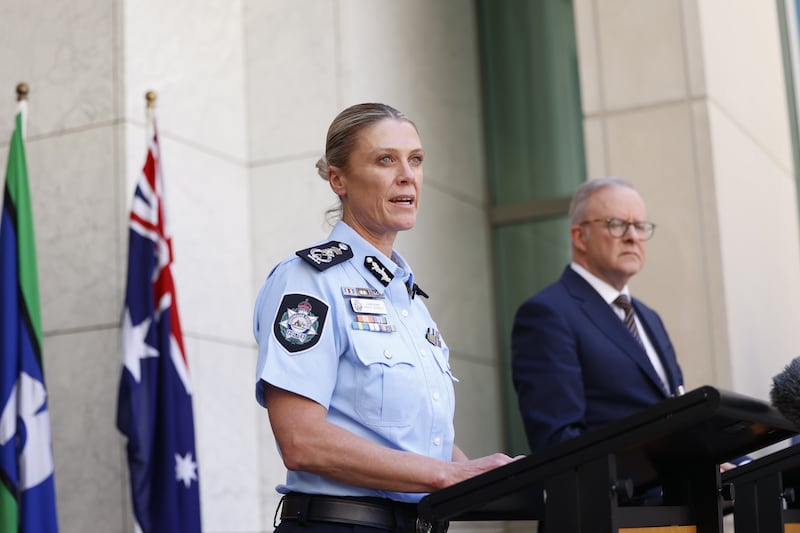Among the many people trapped amid Khartoum’s raging fighting are refugees from other countries, who fled to the city escaping war or dictatorships in their countries of birth.
Before the conflict, there were about 309,000 refugees living in Khartoum, according to the UN Refugee Agency (UNHCR). Many were hoping to be chosen for legal resettlement to western countries, but the number of spaces on offer was low – with only 1,361 refugees resettled from Sudan over the past four years, the UN says.
In an appeal, one refugee, who asked not to be named for security reasons, said they are in desperate need of assistance. He also said that untrustworthy human smugglers – or “brokers” – are already capitalising on the desperation of people, offering trips to neighbouring countries for huge sums of money.
The man – an Ethiopian who has lived in Khartoum for decades – said he believes at least eight refugees have been killed in the fighting so far, though the death toll may be much higher, with communication problems making it hard to keep track.
RM Block
“I know one rape and also some robbed people. These attacks seem local, not by militia ... There are many injuries,” he said, communicating through WhatsApp messages.
The man said looting and robberies meant refugees lost any savings they had, including money they would need to be transported out of Khartoum. “There is no place that I know to go [anyway],” he said. “Who [will] accommodate us?”
The sounds of war have been pretty constant. “I hear in my neighbourhood many bullets entered. Every minute many weapons’ noises devastate our ears.”
He said that even though it is dangerous, refugees are walking on the streets looking for food, ignoring the sounds of explosions nearby. “People [are] on [the] streets searching for survival. This is not normal walking.”
His family has water, occasional electricity and some beans at home but nothing else. “Many shops are closed,” he said. When he encounters other refugees looking for something to eat, he lies because he has too little to share and is worried about his own family. “It is difficult [with] those I know, I tell them I don’t have [anything].”
He said the internet connection is not reliable and getting top-ups to use data is also hard.
If refugees try to escape Sudan, their lack of passports may mean they could be forced to cross borders illegally, making them vulnerable to exploitation.
“That is why we need legal evacuation,” the man said. “Transportation is not easy, [the price] varies from brokers to brokers.” He said he heard of someone paying the equivalent of €2,724 to get to Cairo. Others were considering trying for Chad or South Sudan, but “South Sudan is also dangerous”.

As an Ethiopian refugee, he cannot return to Ethiopia, but he said “if any humanitarian body helps us, except Ethiopia, I [am] happy to go anywhere.”
For Khartoum’s refugees, the situation has seen the fulfilment of their fears and confirmed their argument that Sudan was not a safe place for them.
Sudan’s refugee resettlement programme was also affected by a corruption scandal within the last five years, which saw one staff member found guilty of soliciting bribes and abusing power. Refugees in Khartoum say corruption concerns continued until the recent fighting, though UNHCR says the “oversight mechanisms have been continuously strengthened” and that complaints or concerns can always be reported.
In an email to The Irish Times, UNHCR spokesperson Faith Kasina said the agency is “very concerned about the security situation of refugees, internally displaced people and civilians in Khartoum and across the country. Tragically we have also received unconfirmed reports of refugee casualties but we do not have exact numbers.”
She said reports they’ve received indicate that about 33,000 refugees have fled Khartoum to refugee camps in White Nile State so far; 2,000 to camps in Gedaref; and 5,000 to Kassala – all of which are in Sudan but hundreds of kilometres away from the capital. “In these camps, refugee committees are functioning, and essential services including health and water are operational, with local staff present where allowed,” Kasina said.
“We are extremely frustrated to see so many refugees in need of assistance that we are not able to reach right now,” she added. “Due to the prevailing security situation in Khartoum, UNHCR and many of its partners have had to suspend their assistance programmes. However, we are in contact with refugee and community leaders and hope to resume activities as soon as possible.”
The Ethiopian refugee said he had heard of no refugee leaders having communication with UNHCR, and he doesn’t believe the agency can work alone on this anyway. “We call [on the] international community for help and evacuation,” he said.




















